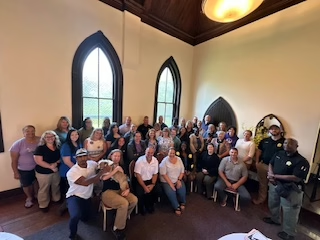
FRANKFORT, KY — Frankfort Police Department, Recovery Café of Frankfort and Lexington, Wanda Joyce Robinson Foundation, and New Vista, along with police social workers from several Kentucky police agencies gathered with community partners to learn essential deflection skills, participating in the two-day training program led by Cordata’s Operation 2 Save Lives (O2SL) and QRT National.
The Deflection Academy took place from August 5th-6th and trained 43 professionals representing organizations from Frankfort, Lexington, and Marion County. The Kentucky Opioid Abatement Commission funded and supported the training.
Deflection is an upstream preventative approach to substance use and mental health that offers pathways for a community-based response to occur before an event such as an overdose, arrest, or mental health crisis. Primary instructors included Karen Maline, Scott Allen, and Daniel Meloy of Cordata’s O2SL and QRT National.
“We were excited to partner with O2SL & QRT National to bring law enforcement, clinicians, recovery coaches, and area leaders the additional training on deflection and pre-arrest diversion pathways,” said Shelley Hearn, Community Policing Advocate of the Frankfort Police Department, who was instrumental in coordinating the training for Frankfort and its neighboring counties.
Cordata’s O2SL and QRT National’s Deflection Academy stands out for its comprehensive overview of nationally recognized deflection pathways. Designed for public safety personnel, certified recovery coaches, clinicians, social workers, and community-based organization specialists, it uniquely focuses on engaging public safety in collaboration with public health and community team members, making it a valuable resource for professionals in the field.
Once implemented, the pathways help community and public safety partners respond to, engage with, and assist persons who have experienced an overdose. The local collaborative can also assist and connect at-risk or vulnerable persons with substance use disorders.
“The training helped everyone understand how we can work together, build on the skills each partner can provide, and develop a ‘best practice’ approach for our ‘Wings of Hope’ QRT initiative,” said Frankfort Police Department, Community Policing Advocate, Tricia Hamilton.
The training also addressed other community needs, such as mental health disorders, drug-endangered children, the impact of trauma and trauma-informed responses, family support initiatives, and more.
“We had a wonderful experience in Frankfort, and we appreciated their participation and engagement in the training,” said Scott Allen, Cordata’s O2SL and QRT National Executive Director of Community Engagement. “We strive to provide the necessary education and resources for all community partners to be prepared when addressing the needs of vulnerable populations.”
The O2SL & QRT National Deflection Academy course is also co-certified for Continuous Education Units (CEUs) for Kentucky police officers and licensed behavioral health professionals.
“This course is extremely beneficial in equipping community partners with skills they need to safely and effectively approach difficult situations,” Daniel Meloy, Executive Director, Community Engagement for Cordata’s O2SL and QRT National. “The preventative approach is instrumental for ensuring community safety, but teaching trauma-informed procedures is essential and allows community partners to address situations with compassion and tact.”
Deflection models operate within communities across the United States. Over the past five years, O2SL and QRT National has delivered customized deflection and collaboration training to partners in Vermont, Rhode Island, Kentucky, South Carolina, Connecticut, Oregon, Wisconsin, West Virginia, Wyoming, and Texas, along with other specialized training and mentoring in numerous additional states.

